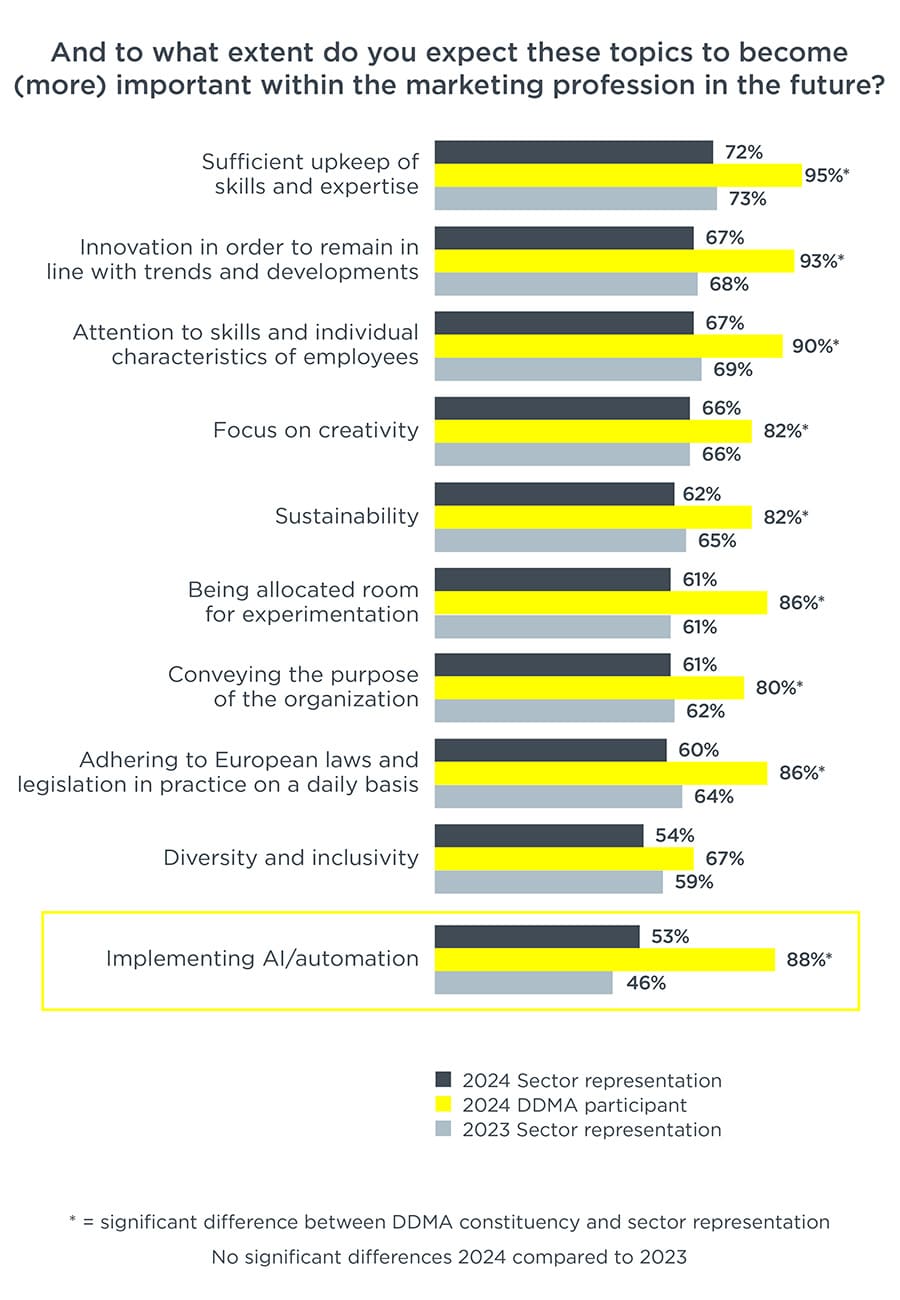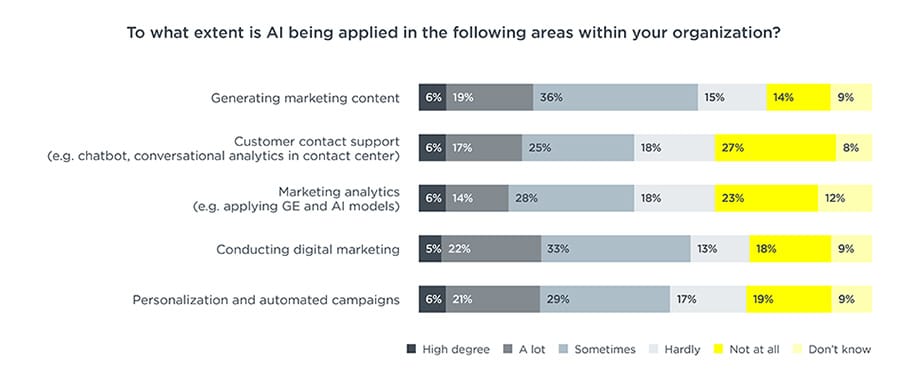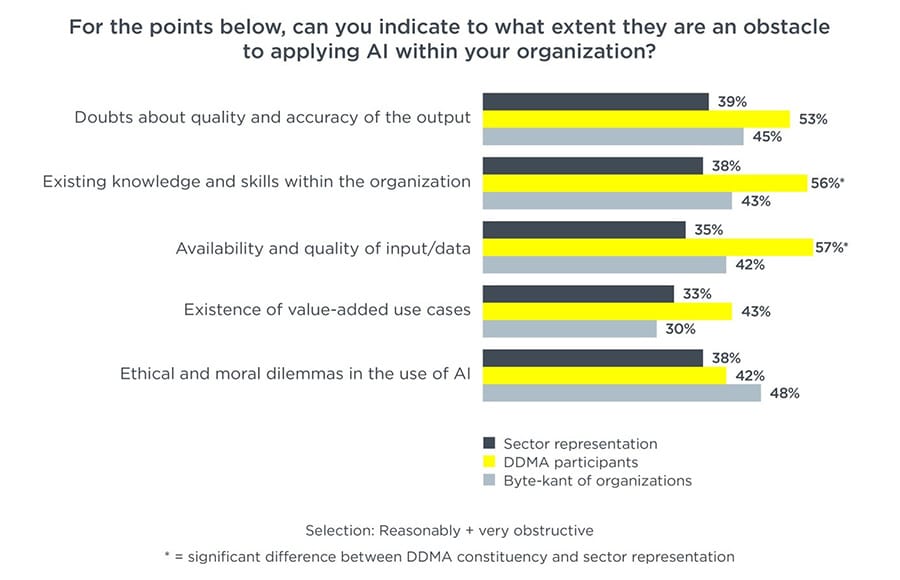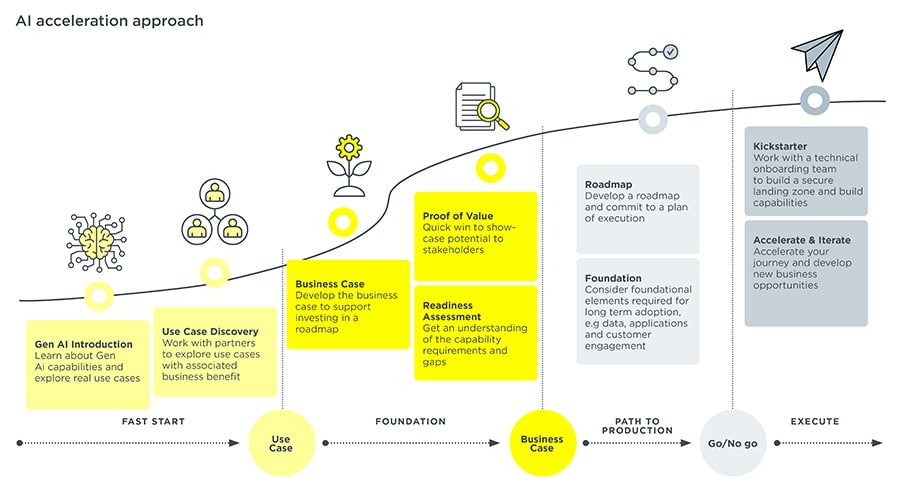Is there actually even an AI hype?
Compared to last year, the DDMO 2024 once again shows that the application of AI is still limited, with 1 in 4 organizations within the marketing sector regularly implementing AI. Moreover, the application of AI is not really assigned a major role in the future: at 53%, this is the topic that is viewed as the least important for the future of the sector. Last year, the application of AI held the same position at 46% (no significant difference compared to 53%), see also the DDMA Barometer 2023 research report: AI a hype for the time being, application in marketing teams not yet taking off. For DDMA participants, the application of AI is an important topic (at 88%), but still not in the top 3 most important for the future.

Application of AI in the marketing sector, especially in low-threshold areas
The application of AI seems to be mainly concentrated on digital – and especially external – channels. A total of 61% indicate that they use AI reasonably often or often for content creation, and 60% for conducting digital marketing. It is striking that the application of AI in customer communication, for example chatbots or conversational analytics in a contact center, is still relatively limited (48% reasonably often to often). In addition, it can be seen that the application of advanced self-learning models (Generative AI) also scores lower (also 48% reasonably often to often).
The familiarity and accessibility of, for example, ChatGPT and other AI-driven tooling for writing texts seem to play an important role in this regard. The same applies to the use of AI to carry out digital marketing, with large tech companies such as Google (Google Ads) making it possible to optimize ad spend and conversions through AI in an accessible way. This means that expertise and tooling from outside the own organisation are mainly used.
Applying AI for chatbots and self-learning models also requires considerably more resources from organizations, but the incremental learning process of the organization is also key in the use of AI in customer applications:
Guido Jongen, Digital Human Advocate at Virtually Human and member of the DDMA Committee Conversational AI: “Under the engine hood, there is a lot of AI taking place in how chatbots recognize and respond to customer questions. This is interwoven in models for NLP and in Machine Learning for recognizing question variations. Generative AI is currently mainly used to support customer service agents in their tasks. As we learn how to control Generative AI, rule out hallucinations, and have clear frameworks around data processing, this promising technology will also be used more for direct service to consumers.”

‘Garbage in, garbage out!’ prevents AI from being applied
The DDMO 2024 shows that a large part of the sector representation generally sees relatively few major obstacles to the application of AI. It is worth noting that the DDMA participants score a lot higher here: for 57% (compared to 35% of the sector representation), the availability and quality of input/data are reasonable to very obstructive, as is the quality and accuracy of the output (53% compared to 39% of the sector). This probably has to do with the fact that DDMA’s participants are slightly more familiar with the (im)possibilities of applying AI. For example, the byte side of organizations (roles such as analyst, developer, programmer, data scientist or engineer) also experience more obstacles, which can also be linked to the experiences and familiarity people have in terms of this subject.
Not only does data quality play a key role for AI; there is a general concern about both the quality and availability of data within marketing, as described earlier in the DDMO deep dive on the availability, quality and application of data by organizations in the marketing sector. Also in the recently published DDMA article ‘Shall we not talk about AI for once? in the context of the 2024 DDMA Digital Analytics Summit, data quality already emerged as a strong impediment to ambitions in the field of AI: “So in order to ensure the effective execution of marketing AI you should never forget that garbage in, results in garbage out.” The DDMA Data, Decisions & Engagement (DDE) committee therefore sees the importance of having your first-party data and MarTech up to par as the most important solutions to this problem. Even now that there will not be a complete third-party cookie ban, the use of high-quality ‘own’ data is necessary – precisely for privacy reasons and, above all, for practical reasons.

Expectation for the future of AI in the marketing sector
Just like Big Data in the past, AI seems to be a hype for many fellow marketing professionals for the time being. However, it is pleasing to see that AI is already being used in relatively low-threshold applications such as content creation and digital marketing; maybe that’s why it’s already understatedly gone beyond the hype. The time for talking has passed, and many organizations are already “doing” AI. Applications such as ChatGTP and Google AI solutions show that AI is quickly adopted when it is accessible to a wide audience.
However, there is also still a great deal that is not yet possible, and the biggest challenge lies in the use of AI in more advanced applications such as chatbots and self-learning marketing models. This raises a fundamental problem, as the use of self-learning marketing models and AI chatbots requires its own data. The quality and availability of data is crucial in order to achieve these ambitions in AI. AI within marketing has much more potential, but having first-party data and MarTech in order are important preconditions for the successful application of AI – and above all, it is an incremental learning process for organizations.
What’s the best way to get started with AI?
During the DDMA AI Meetup on September 12, 2024, practical tools were handed out to get started with AI. A few key things that are helpful to remember:
- AI is not the solution to all problems. Just like you don’t use a hammer to knock screws into place; it must be clear what your problem is, and how AI can possibly provide a solution.
- Start with small steps: just as the findings from the DDMO 2024 show: start with small-scale cases where you use external tooling and/or experts such as content creation or a specific digital marketing solution.
Define your roadmap and the required capabilities based on the outcome of these cases.

About the Data-Driven Marketing Survey (DDMO) 2024
The DDMO is an independent initiative of the DDMA trade association and the DDMA Committee on Data, Decision & Engagement. The annual survey maps out how the marketing sector in the Netherlands processes data and uses (customer) data, with the aim of providing insight and advice into how data-driven the marketing sector is and where opportunities and challenges lie.
Through three deep dives, the most important insights of the DDMO 2024 were further elaborated. The summary article, including full research justification, can be read here. The other 2 deep dive articles discuss the availability, quality and application of data by organizations in the marketing sector and the importance of soft skills within the marketing sector.
The target group and sample of the DDMO 2024 consists of 520 Dutch people working within the marketing sector, recruited through the GfK panel, who answered positively to the question of whether they mainly perform marketing-related activities.
Do you have any questions or comments about this study? If so, please send an e-mail to info@ddma.nl.
Ook interessant

Podcast Shaping the Future: “Zonder experimenteren vaar je blind”

Eén datafundament is niet genoeg voor AI






